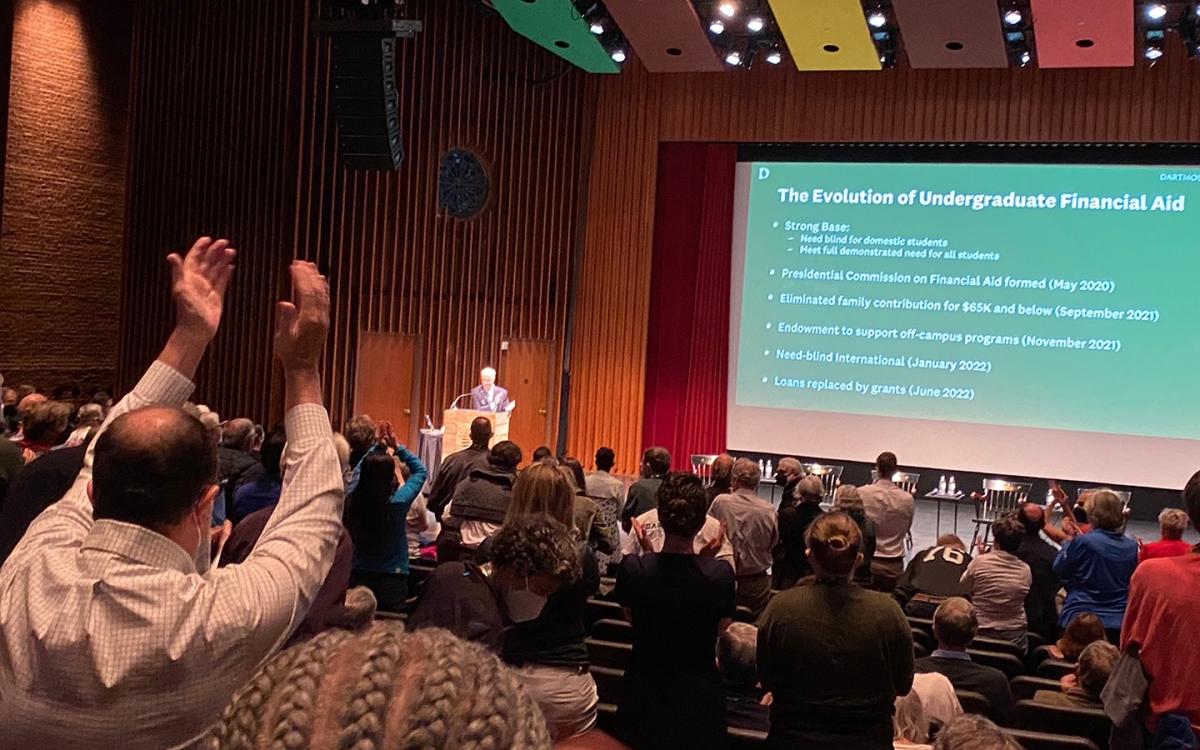DAVOS, Switzerland — The annual summit of the world’s financial elite is often a mix of bluster and cocktail parties, with finance ministers and billionaires rubbing elbows and trying to square off over the next big deal.
At Davos 2022, recession risks and rising inflation weigh heavily

Beyond mandatory coronavirus testing, the mood is decidedly gloomy, weighed heavily by worries about the coronavirus crisis, continuing warfare, worsening economic inequality and fears of a global economic slowdown.
“We’ve never had a Davos like this,” said Rich Lesser, global president of Boston Consulting Group, in an interview. “The challenges of the world seem quite immense. There is a lot of uncertainty and anxiety about the tightrope that governments have to walk to contain inflation without pushing economies into recession. How will the war unfold? What will happen in China? We are looking at all of that.
After months of solid growth, the US economy unexpectedly contracted early this year, largely due to a widening trade gap. Americans’ insatiable appetite for goods like cars, appliances and furniture during the pandemic has led to a surge in imports that has far outpaced exports to other countries, where the pandemic recovery has been less robust.
But increasingly, business leaders and economists worry that the outlook abroad — with the war in Ukraine and major global economies like Europe and China giving warning signs — could slow the domestic economy. The U.S. stock market has plunged in recent weeks on fears of a recession, with the S&P; 500, Nasdaq and Dow Jones industrial averages all down at least 6% in the past month.
“When inflation gets into the system, it takes a while to get in, but it takes a lot longer to get out,” said David M. Rubenstein, co-founder and co-chairman of The Carlyle Group, during of a round table. “It took a few years to set it up, it’s going to take a while to get it out.”
“Not all recessions are equal…and recessions are not the end of the Earth,” he added. “That shouldn’t be a big cause for concern if it’s a mild recession.”
But there are also signs of continued economic momentum. U.S. consumers, who have been spending big on big-ticket items, have been a bright spot in the economy so far. But some leaders say the momentum is starting to weaken as households use the money they saved at the start of the pandemic. Average savings accounts have risen to around $2,000 from $400 previously, largely due to government stimulus, Dan Schulman, chief executive of PayPal, said during a panel at the forum. But if inflation stays where it is and spending continues, those extra savings could disappear by the end of the year, he warned.
“We’re already seeing a reduction in spending at lower income levels, and it’s now rising at middle incomes,” Schulman said, adding that inflation poses another challenge to consumer spending. “Based on my conversations with major retailers around the world, none of us think things will come back by the end of this year. We all expect inflation to stay high.
Inflation, which remains stubbornly at a 40-year high, has driven prices up 8.3% over the past year and wiped out wage gains for nearly all Americans. Soaring prices for goods such as food and fuel have drastically reduced household and business budgets. Gas prices have risen more than 50% in the past year to a record high of $4.60 a gallon, according to AAA.
“If consumer confidence really continues to decline, the markets continue to show a lot of instability and lack of foundation…and that confidence continues to decline, which for me can become self-fulfilling in a recession,” Adena Friedman , chief executive of the Nasdaq, said during a panel discussion. “That’s where I see the non-zero [recession] risk.”
In an outlook report released on Monday, the World Economic Forum warned that “high or very high” inflation would reduce people’s purchasing power, especially in low-income economies, and worsen food insecurity across the country. Middle East, Africa and South Asia. Many have also raised concerns about worsening growing inequality in the coming months. According to World Bank projections, about 657 million people live in extreme poverty, compared to 641 million before the pandemic.
“The pandemic and the war in Ukraine have fragmented the global economy and created profound consequences that risk wiping out the gains of the past 30 years,” Saadia Zahidi, chief executive of the World Economic Forum, said in a statement this week. “Leaders face tough choices and trade-offs domestically on debt, inflation and investment.”
The conference, held virtually last year and pushed back four months this year, has long been synonymous with wealth, prestige and power, and all that they represent. But this year, much of that has been reduced, in part due to global and economic turbulence. Parties are less ostentatious, dinner parties are smaller, and many business executives say they’ve cut their attendance list by a third to a half. Celebrities such as Angelina Jolie, Matt Damon and Bono, who have all participated in the past, are not on this year’s list.
Several Davos stalwarts, including the CEOs of Goldman Sachs, JPMorgan Chase and BlackRock, are also conspicuously absent. President Biden is in Japan instead, although US Secretary of Commerce Gina Raimondo is present. There are fewer representatives from China and none from Russia, which was excluded following the country’s attack on Ukraine.

/cloudfront-us-east-2.images.arcpublishing.com/reuters/33GJF3JSZ5K2JIQB3QJGODWCNQ.jpg)




